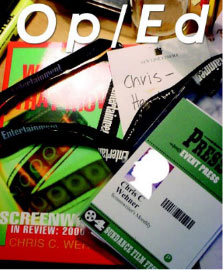
Hollywood Remakes Again and Again...
June 9th, 2004

Purists and the like have bemoaned Hollywood’s current (and recurrent) obsession with �Remakes,� �Re-imaginings,� �Sequels,� and �Pre-equals.� For a long time Hollywood has been fascinated with remaking films that were financially successful. But how far back does this obsession go?
Hollywood seems to get into trouble when it tries to remake or re-imagine classics, like it will do with The Manchurian Candidate this summer. Lord of the Rings adaptation king Peter Jackson announced recently that a remake of King Kong is in order. We’ve got Scott Frank apparently working on a remake of The Flight of the Phoenix.
Recent releases include Freaky Friday, starring Jamie Lee Curtis, which was originally produced in 1976 with Jodie Foster and Barbara Harris; Cheaper by the Dozen with Steve Martin, which was originally written by Hollywood great Lamar Trotti, who adapted from a book by Frank B. Gilbreth Jr. and Ernestine Gilbreth Carey. The Rat Pack’s 1960 film Ocean's Eleven is now spawning a sequel, Ocean’s Twelve (after the remake of course), and most recently we’ve seen the awful remake The Alamo.
So what of Classic Hollywood, the so-called �Golden Age.� Did they lower themselves to such antics?
Harry Kurnitz, a former reporter turned A-List Hollywood screenwriter of the 1940s is one example. His first three credits as a professional screenwriter, Fast Company (1938), Fast and Loose (1939), and again in 1939 with Fast and Furious all recycled plots involving a character he created, Joel Sloane, a rare book dealer and part time detective.
And how many times from the silent era to the 1950s did Hollywood remake The Prisoner of Zenda? By my count, five � which doesn’t include two additional remakes, one in 1979 and another in1988.

Let’s not forget about one of Hollywood’s first successful screenwriting duos, Frances and Albert Hackett. They received four Academy Award Nominations, and it’s interesting to read the titles � The Thin Man (1934), After the Thin Man (1936), Another Thin Man (1939)
Hitchcock remade his movies all the time, The Man Who Knew Too Much in 1934 and in 1956. Not only did Hitchcock remake his movies, he recycled his scenes.
Storylines have been recycled countless times and have so for years. In 1963 Marc Behm and Peter Stone wrote Charade, a romantic suspense thriller set in Paris, where a woman’s husband is found dead. Money is missing, and a male pursuer befriends her. But who can she trust? This is a well-worn plot most recently copied with Mark Wahlberg starring in The Truth About Charlie, an awful film.
Perhaps the most infamous and ultimate example of recycling comes from Hollywood screenwriting legends Ben Hecht and Charles McArthur, who in the late 1930s took a poem by Rudyard Kipling and made it into a feature length screenplay, Gunga Din, an incredible accomplishment. Their agent, the famous Leyland Hayward, sent the script to every major studio, and all except one responded the first day with an offer. The one studio that didn’t � Columbia, which was run by none other than Harry Cohn. Curious, Hayward contacted Cohn and inquired as to the reason for not making an offer. After all, we’re talking about Ben Hecht here, the most respected screenwriter working in Hollywood. Cohn responded curtly to Hayward, saying he didn’t need to bid as he already owned the story. Dumbfounded, Hayward laughed and asked what he meant. Cohn told him he had bought the story and made it into a movie in 1931 called The Front Page. Hayward laughed and hung up. Weeks later, curious, Hayward went back and read the script for The Front Page, and sure enough, �Hecht and MacArthur had taken not only the story, but the characters, changed the period, the locale, and the occupations.� (Max Wilk �Schmucks with Underwoods� Applause, New York, 2004) By the way, RKO produced Gunga Din, which was released in 1939.
So as we have discovered, it’s not just the modern Hollywood conglomerate that has been attracted to financially successful remakes. Perhaps the new Hollywood is no different than the old one.
 Chris Wehner is a film critic for the Movie Review & Screenplay Database (www.iscriptdb.com), editor-in-chief (and publisher) of Screenwriters Monthly, author of Screenwriting on the Internet: Researching, Writing, & Selling Your Script on the Web (2000) and Who Wrote That Move? Screenwriting in Review: 2000-2002 (2003), script reviewer, and founder of ScreenwritersUtopia.com. He is also Vice President of Development for MoviePartners, Inc. He is currently developing (and writing) several projects for various companies. He has been involved with screenwriting for nearly 10 years and in many different capacities.
Chris Wehner is a film critic for the Movie Review & Screenplay Database (www.iscriptdb.com), editor-in-chief (and publisher) of Screenwriters Monthly, author of Screenwriting on the Internet: Researching, Writing, & Selling Your Script on the Web (2000) and Who Wrote That Move? Screenwriting in Review: 2000-2002 (2003), script reviewer, and founder of ScreenwritersUtopia.com. He is also Vice President of Development for MoviePartners, Inc. He is currently developing (and writing) several projects for various companies. He has been involved with screenwriting for nearly 10 years and in many different capacities.
Only logged-in members can comment. You can log in or join today for free!
No comments posted.
Advertisement

















